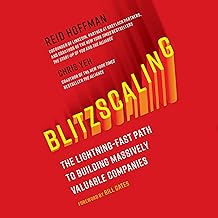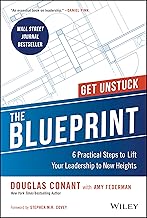
Blitzscaling: The Lightning-Fast Path to Building Massively Valuable Companies
Reid Hoffman, Chris Yeh, et al.
4.5 on Amazon
7 HN comments

The Most Important Thing: Uncommon Sense for The Thoughtful Investor
Howard Marks, John FitzGibbon, et al.
4.6 on Amazon
7 HN comments

Getting Past No: Negotiating in Difficult Situations
William Ury
4.6 on Amazon
7 HN comments

Sell or Be Sold: How to Get Your Way in Business and in Life
Grant Cardone
4.7 on Amazon
7 HN comments

So You Want to Talk About Race
Ijeoma Oluo
4.7 on Amazon
6 HN comments

COVID-19: The Great Reset
Klaus Schwab and Thierry Malleret
3.7 on Amazon
6 HN comments

Great by Choice
Jim Collins, Morten T. Hansen, et al.
4.6 on Amazon
6 HN comments

Imperialism the Highest Stage of Capitalism
Vladimir Ilich Lenin
4.8 on Amazon
6 HN comments

The Professional Chef
The Culinary Institute of America (CIA)
4.8 on Amazon
6 HN comments

Options as a Strategic Investment: Fifth Edition
Lawrence G. McMillan
4.7 on Amazon
6 HN comments

Trading: Technical Analysis Masterclass: Master the financial markets
Rolf Schlotmann and Moritz Czubatinski
4.5 on Amazon
5 HN comments

The Blueprint: 6 Practical Steps to Lift Your Leadership to New Heights
Douglas R. Conant
4.6 on Amazon
5 HN comments

Causal Inference: The Mixtape
Scott Cunningham
4.7 on Amazon
5 HN comments

Trillion Dollar Coach: The Leadership Playbook of Silicon Valley's Bill Campbell
Eric Schmidt, Jonathan Rosenberg, et al.
4.6 on Amazon
5 HN comments

No Rules Rules: Netflix and the Culture of Reinvention
Reed Hastings and Erin Meyer
4.6 on Amazon
5 HN comments
baakssonJune 29, 2015
mikeg8onNov 25, 2013
rpedelaonJune 29, 2015
1. http://www.jimcollins.com/books.html
2. https://en.wikipedia.org/wiki/Pacific_Southwest_Airlines
ryanlchanonDec 22, 2011
However, I think you gave one of the most valuable and counter-intuitive points in the book too light a treatment: That successful 10X'ers not only consistently hit their goals, but actively tried not to exceed them.
Living in the start up echo chamber you'd think that "speed" was everything; we do "agile" development, we take venture rounds to "supercharge growth". Hockey stick graphs are treated like the tech world's pornography, depicting circumstances just a tad too good to be real. The mantra is that if a little growth is good, a lot of growth is really good.
GBC turns that on its head. Growth is good, but only a little bit. Only as much as you can handle. Explosive growth can quickly become uncontained growth can quickly become webvan. Facebook limited itself to college campuses, taking years to go public. Southwest started with 3 planes and didn't expand their routes until they had to. Zipcar stayed in Boston until it was absolutely sure it was ready to go to NYC.
The 20 mile march is as much about having discipline in self-restraint as it is about pushing forward.
wushuporkonDec 23, 2015
Growth Hacker Marketing by Ryan Holiday
How to Fail at Almost Everything by Scott Adams - great read
Scaling Up By Verne Harnish
Great By Choice by Jim Collins - love the whole series
The Ultimate Sales Machine by Chet Holmes - probably worth a reread
How to Win at the Sport of Business By Mark Cuban - good read
Elon Mush by Ashlee Vance - need I say more
The Hard Thing about Hard Things By Ben Horowitz
The Power of Habit by Charles Duhigg - probably need to deeply absorb this - a lot of good stuff
Copy This! By Paul Orfalea - another good "small business" entrepreneur book
The E-Myth Revisited By Michael Gerber - 2nd time read. Got more out of it this time.
The People's Tycoon (Ford) by Steven Watts - I love reading about businessmen from this age
Scrum by JJ Sutherland Jeff Sutherland - good read for development teams
moffatbrianonNov 30, 2011
The authors compare the leadership at companies that consistently outperformed their competitors during good times and bad, with the leadership at the nominally-performing companies.
The outperforming leaders set a benchmark defining "consistent progress", e.g. profitable every year (Southwest Airlines), 20% growth per year (Stryker), etc. They then fought to achieve that benchmark even during the toughest years (perhaps obvious), but they also restrained themselves so as to not exceed (by much) their benchmark during the "boom" years. Even though it might seem counter-intuitive, these "restrained" companies performed better over the long run than those companies which grew quickly during the good times.
The point is perhaps that you might achieve more by both committing to, and limiting yourself to, some more reasonable number of hours per week.